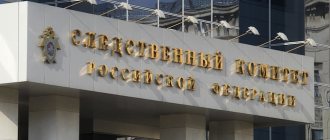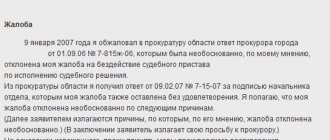Complaint against the actions of the investigator
Appealing the actions of an investigator during criminal proceedings is an important and integral part of the work of a lawyer in a criminal case. As a rule, the actions of the investigator, which in one way or another affect the rights and freedoms of citizens, are implemented and formalized through the relevant decisions of the investigator. If we are talking about complaints, statements, petitions of participants in criminal proceedings, both from the prosecution and from the defense, then any response to the petition of one or another participant is formalized by the corresponding resolution of the investigator to satisfy, for example, the petition, or to refuse it .
It is not always the case that, especially if we are talking about the defense side, requests and statements of a participant in the proceedings are enthusiastically met by the investigator. Each of them, as a rule, has his own ideas about the procedure for investigating a criminal case, the procedure for establishing all the circumstances of what happened and observing the rights and freedoms of man and citizen. However, despite the fact that one of the main tasks of criminal proceedings is the protection of the individual from illegal and unjustified restrictions on his rights and freedoms (Article 6 of the Code of Criminal Procedure of the Russian Federation), even actions of the defense that are completely based on the law are sometimes met with unmotivated, fierce opposition from investigators. A timely filing of a complaint against the investigator, or more precisely against his actions and (or) decisions, helps to reason with the investigator who is freely and unilaterally interpreting the provisions of the law in his favor, and to return him to the mainstream of respecting the rights and freedoms of the accused in a criminal case.
An example is a case that occurred during the investigation of a criminal case under Part 4 of Article 159 of the Criminal Code of the Russian Federation, which was being processed in one of the district divisions of the internal affairs bodies. During familiarization in accordance with Art. 206 of the Code of Criminal Procedure of the Russian Federation with a number of examinations, including technically complex ones, such as examinations of the prescription of the document, examinations of the age of the paper on which the document was made, financial and economic examinations, etc., the defense attorney tried to photograph the expert opinions. Typically, these actions do not meet with misunderstanding on the part of the investigator. It is obvious to everyone that complex technical, financial and economic examinations are difficult to understand, let alone check. To understand and analyze their content, assess the quality of the research, and, consequently, the reliability of the expert’s conclusions, explanations from specialists in one or another field of knowledge, and sometimes more than one, are often required. That’s why lawyers photograph these expert opinions, so that later, with the participation of specialists, they can properly understand and analyze both the research itself and its conclusions. However, in this case, the defense attorney’s attempts to photograph documents began to be suppressed in the most decisive manner by the investigator, to the point of snatching expert opinions from the lawyer’s hands, covering the phone’s camera lens with his hands, etc.
The investigator justified his desperate actions by the absence in Article 206 of the Code of Criminal Procedure of the Russian Federation of permission for photography, as well as any kind of copying of documents presented for review. The possibility of copying case materials presented to the defense for review, in the opinion of the investigator, related exclusively to the stage of familiarization with all materials of the criminal case in accordance with Article 217 of the Code of Criminal Procedure of the Russian Federation.
Due to the lack of desire to participate in the scandal and physical altercations with the investigator, the defense decided to appeal the actions of the investigator. The lawyer submitted a written request to photograph all the examinations presented for review, which, naturally, was denied. The tactic of writing a petition to the investigator was chosen in order to save oneself from the need to prove the very fact of the investigator’s physical implementation of actions to impede the photographing process. The investigator's written decision was itself both a reason for appeal and evidence of illegal actions carried out by the investigator. The decision was received from the office of the district investigative department, and soon the defense prepared a corresponding complaint. It was decided to complain about the actions of the investigator and the decision he made to the district prosecutor's office in accordance with Article 124 of the Code of Criminal Procedure of the Russian Federation.
The complaint against the investigator to the prosecutor's office set out in detail the arguments and arguments about the violation of the rights of the defense in a criminal case and the illegality of the actions of the investigator and the decision he made. Naturally, all the defense arguments set out in the complaint against the actions of the investigator were supported by references to the norms of the Constitution of the Russian Federation, the legal positions of the Constitutional Court of the Russian Federation, and the norms of the Code of Criminal Procedure of the Russian Federation.
The defense's arguments set out in the complaint against the investigator to the prosecutor's office were found to be justified. As a result, the complaint against the investigator’s actions was fully satisfied by the prosecutor’s resolution, and a demand was made to the head of the district investigation department to cancel the investigator’s resolution preventing the defense attorney from photographing examinations in a criminal case.
Sample complaint against the investigator's decision:
Prosecutor's decision to satisfy the complaint against the investigator.
- Share on facebook
Added 07/16/2019 | Litigation practice, Criminal cases
Participants in criminal proceedings
There are a great many reasons why individuals and legal entities can contact the police or the prosecutor’s office. Among these reasons are statements of crimes committed, to which law enforcement agencies must respond within the time limits established by law. The reaction can be either the initiation of a criminal case or a refusal to initiate one.
From the moment when an individual or legal entity files a complaint about a crime, he becomes a participant in criminal proceedings and is given the right to appeal against the actions or inactions of the investigative, inquiry, prosecutor's office or court.
If a criminal case has been initiated, the status of a participant in criminal proceedings can be obtained by an indefinitely wide range of persons, each of whom, in accordance with Article 123 of the Code of Criminal Procedure of the Russian Federation, receives the right to appeal those actions of the investigative authorities that in one way or another affect their legitimate interests and constitutional rights.
Content
Investigative authorities are not the structure that will find fault with the registration of a complaint. It is enough for it to indicate:
- the name of the investigative body and the official of this body whose actions you are appealing;
- Full name and address of the applicant indicating his procedural status;
- number of the criminal case or registration number of the material in case the refusal to initiate a criminal case is appealed;
- an indication of the specific action (or inaction) that you are appealing. For example, “On December 12, 2022, I filed a petition to appoint an examination. More than two months have passed since the application was submitted, but the investigator has still not spoken on my application”;
- date of filing the complaint and signature of the applicant.
Whether or not to motivate a complaint with references to regulations is entirely at the discretion of the applicant. The complaint will be considered in any case.
There is definitely no point in going deeper into the motivation if the arguments of the complaint relate to obvious facts, for example, procedural violations when drawing up a resolution.
However, we note that investigative authorities are not always familiar with the intricacies of legislation, for example, with generalizations and decisions of the Plenum of the Supreme Court of the Russian Federation. This does not mean that bad lawyers work in investigations, it means that interpretations of legislative acts and generalizations of judicial practice occur quite often, and lawyers do not always have the opportunity and time to track them.
If there is no direct indication of the law on a specific action of the investigation, but it is in the Resolution of the Supreme Court, be sure to make a reference to it.
How to write a complaint to court
The court has the right to consider citizens' complaints in the form of statements of claim. The document must be sent to the district court in whose territory the pre-trial investigation is being conducted. Claims are filed through the office, by registered mail or transmitted with the help of a legal representative.
A properly completed claim must contain the following information:
- Name of the court.
- Profile and contact details of the plaintiff.
- A detailed statement of the circumstances of the case.
- List of requirements.
- Date and signature.
If the claim is filed incorrectly, it will be rejected. If you do not have sufficient skills in drafting a document, it is advisable to seek help from a lawyer.
The court's decision may fully or partially satisfy the claims set forth in the claim. The actions of an official are recognized as unlawful if there are sufficient grounds for this. You can appeal the district court's verdict through the appellate procedure.
Central office of the Investigative Committee
You can contact the central office of the Investigative Committee in one of the following ways:
- Make an appointment with the head of the main department of the Investigative Committee.
- Submit a claim in person to the reception committee at the address: Moscow, st. 1st Frunzenskaya, 3a.
- Send the application by a valuable letter with notification to the address for written requests from citizens: 105005, Moscow, Tekhnicheskiy Lane, 2.
There are also several telephone lines for citizens to contact:
- 8-800-100-12-60 – using this number you can report unlawful actions of employees of the Investigative Committee, including manifestations of corruption. Calls are free from anywhere in Russia, the line operates 24 hours a day.
- 8-800-100-12-70 – telephone number for contacting the Chairman. The direct line is open every first and third Wednesday of the month from 14.00 to 19.00.
You can contact the Investigative Committee using the Internet reception at https://sledcom.ru/#reception. When writing an appeal, you should take into account that appeals that contain:
- obscene language;
- text written in Latin or capital letters;
- incomplete address of the applicant;
- a statement without specifying specific complaints and suggestions.
If the heads of lower investigative bodies did not make a decision on citizens’ appeals, in accordance with Order of the Investigative Committee at the Prosecutor’s Office of the Russian Federation dated September 19, 2007 No. 17, the complaint is sent to the appropriate body within 7 days from the date of registration. The applicant must be notified of the redirection of the complaint.
Complaints submitted through the Internet reception are processed in accordance with the Federal Law “On the procedure for considering appeals from citizens of the Russian Federation” dated 05/02/06.
In accordance with the Federal Law "On the Prosecutor's Office of the Russian Federation", supervision of investigative bodies is carried out by the prosecutor. This means that complaints against a representative of the investigative bodies can be filed with the prosecutor’s office, but only after there has been no response to the appeal from the head of the investigative agency at the place of residence. However, you can file a complaint with the prosecutor’s office and at the same time contact the head of the investigative department.
Separately on the selection of a preventive measure
As part of the investigation of criminal cases, investigative authorities may file petitions to select a preventive measure against suspects or accused in accordance with Article 476 of the Code of Criminal Procedure of the Russian Federation.
Court rulings on the selection of a preventive measure, although they relate to the materials of the pre-trial investigation, have a completely different appeal procedure. They cannot be appealed to the prosecutor or the head of the investigative body.
An appeal against court rulings in this part is filed with a higher court.








